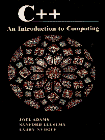Synopsis:
Offers students an introduction to traditional computing, covering such areas as scalar objects, the concept of I/O, reusability, control structures, functions and parameter passing, and modular programming. The text then covers non-scalar (class) objects to illustrate more fully the power of C++ objects.
Product Description:
In the Second Edition, these best-selling authors provide the beginning computer science student or professional with an understanding of the discipline, methodologies, and techniques of programming as they apply to the broad field of computing. The authors' successful pedagogical aids such as real-world exercises and projects, Quick Quizzes, and Programming Pointers are continued in the Second Edition. KEY FEATURES: Parts of the Picture sections introduce students to the discipline of computer science - ethics, artificial intelligence, computer architecture, and networking. New sections have been contributed by experts in the field such as William Stallings. NEW - This edition uses the "spiral" approach to learning in which central topics are introduced early and then revisited in increasing detail throughout the text. NEW - Includes an introduction to the Standard Template Library. NEW - Problem-solving methodology is used consistently in examples and applications that gradually increase in complexity. NEW - A new approach to design, Object-Centered Design (OCD), is introduced in Chapter 1, and emphasizes using reusable program components. Students build their own libraries of useful functions and learn first-hand how to write programs from existing components.
"About this title" may belong to another edition of this title.
![]()
